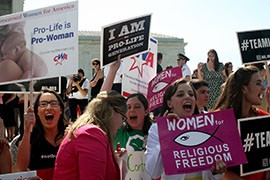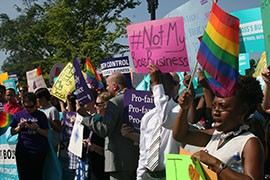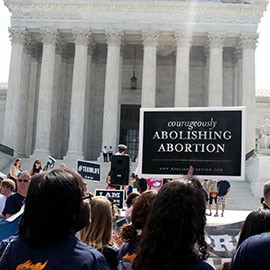Cronkite News has moved to a new home at cronkitenews.azpbs.org. Use this site to search archives from 2011 to May 2015. You can search the new site for current stories.
Arizona advocates hail, condemn Supreme Court ruling on contraception
Editor’s Note: A previous version of this story misquoted Sen. John McCain, R-Ariz. A statement from McCain's office called the ruling a "victory for religious freedom and individual liberty in the face of big-government mandates." The story below has been revised to correct the quote. Clients who used this story are asked to run the correction that can be found here.
WASHINGTON – Arizona lawmakers and pro-life groups hailed Monday’s U.S. Supreme Court ruling that “closely held” businesses cannot be forced to provide certain contraceptives as part of health-care coverage for their employees.
But while supporters called the decision in Burwell v. Hobby Lobby a “victory for religious freedom,” opponents countered that the 5-4 ruling by the court is “disrespectful and takes away from the religious rights of employees.”
Both sides agreed on one thing – this is likely not the end of the fight.
“We’ve lost the battle, but the war has just begun,” said Sarah Polk, a pro-choice protester who came from Texas to be on hand for Monday’s ruling.
The case involved Hobby Lobby stores and Conestoga Wood Specialties Corp., two family-run businesses that claimed the Affordable Care Act’s requirement that employers provide contraceptive coverage for employees conflicted with their “sincerely held” religious beliefs.
Specifically, the companies challenged the Obamacare requirement that workers have access to four forms of contraception that prevent the development of an embryo, which they said violated their opposition to abortion.
The court agreed, saying that while the government had an interest in requiring contraceptive coverage, the Religious Freedom Restoration Act required that it find the least-restrictive way to do so if that interest burdened a person’s free exercise of religion. The health care act overreaches, the court said.
“There are other ways in which Congress or HHS (the Department of Health and Human Services) could equally ensure that every woman has cost-free access to the particular contraceptives at issue here,” Justice Samuel Alito wrote for the court.
In a sharp dissent, Justice Ruth Bader Ginsburg said the ruling of “startling breadth” would allow businesses to “opt out of any law (saving only tax laws) they judge incompatible with their sincerely held religious beliefs.”
But Alito, responding to charges that the ruling would let businesses engage in discriminatory practices or refuse to provide immunizations under the guise of religion, said the decision “provides no such shield.”
“Our decision in these cases is concerned solely with the contraceptive mandate,” Alito wrote.
But Bryan Howard, president of Planned Parenthood Arizona, called the ruling “absolutely unbelievable.” He said the decision is a “violation, disrespectful and takes away from the religious rights of employees.”
“We are allowing a very small group of wealthy business owners decide what’s best for people they don’t even know,” Howard said. “If businesses are entitled to the protection their religious beliefs, then so should their employees.”
But Dorinda Bordlee, senior counsel for the Scottsdale-based Bioethics Defense Fund, called it a “huge victory for family-run business everywhere.”
“We’ve stopped the government from bullying the little guy and preventing them from running businesses how they chose to, religion aside,” said Bordlee, whos groups filed friend-of-the-court briefs in support of Hobby Lobby.
The ruling was praised by Sen. John McCain, R-Ariz., one of several state lawmakers – along with Attorney General Tom Horne and Rep. Trent Franks, R-Glendale – who signed on to friend-of-the-court briefs in support of Hobby Lobby. In a prepared statement, McCain called the ruling a “victory for religious freedom and individual liberty in the face of big-government mandates.”
Kristina Arriaga, executive director of the the Becket Fund for Religious Liberty, which represented Hobby Lobby, said there’s a reason freedom of religion “is the First Amendment, not 14th or the Ninth.”
“Because it is the most important protection our government gives to its citizens, and employers should be given the same freedom,” she said.
But Rep. Raul Grijalva, D-Tucson, who joined in brief opposing Hobby Lobby, said in a joint statement with Progressive Caucus co-chair Rep. Keith Ellison, D-Minn., that the ruling was a “step backwards for women’s rights in America.”
Outside the court Monday, where hundreds of protesters gathered for the decision, opinions were just as divided.
“It’s unfair and it’s unjust,” said Polk after the ruling, pausing between chants she was shouting into a makeshift megaphone. “This is a war on women, for our rights, and they can’t be taken away from us because of someone else’s religious belief.”
But as pro-life groups flooded the plaza in front the court, Missy Martinez, a “very proud” member of Students for Life of America said she could not have been happier about the decision.
“As a country we bend over backwards every day to protect religious freedom, then it comes to birth control and all of a sudden everything’s different?,” said Martinez. “There’s nothing fair or equal about that.”
“If you want birth control, do what you’ve got to do,” she said. “But don’t impose on people’s religion. I feel more equal and more protected by our government than ever before.”
Martinez said both sides were fighting for women, even though their means were different.
But Howard said the Hobby Lobby ruling would deny women “a fundamental right.”
“I’m extremely certain that that this will give employers a way to discriminate against women,” Howard said. “Men and women do not require the same types of regular medical care and this is denying women their fundamental right to health care.”










